Last Updated on October 18, 2023
Learn how to make soil fertile naturally by using kitchen scraps (no compost heap needed).
A lot of gardeners wonder how to improve soil quality naturally.
There are a lot of known time-consuming methods to improve garden soil quality: growing cover crop, crop rotation, mulching, using manure, creating and adding a compost from your backyard compost bin.
But I want to concentrate on how to enrich soil in the easiest and simplest way – by using food scraps from your kitchen. This method fits especially well for a small garden.
And we can do it without an outdoors compost pile, because, to be honest, not everybody, especially if your garden is small, has enough garden waste, outdoors space, or time for backyard composting.
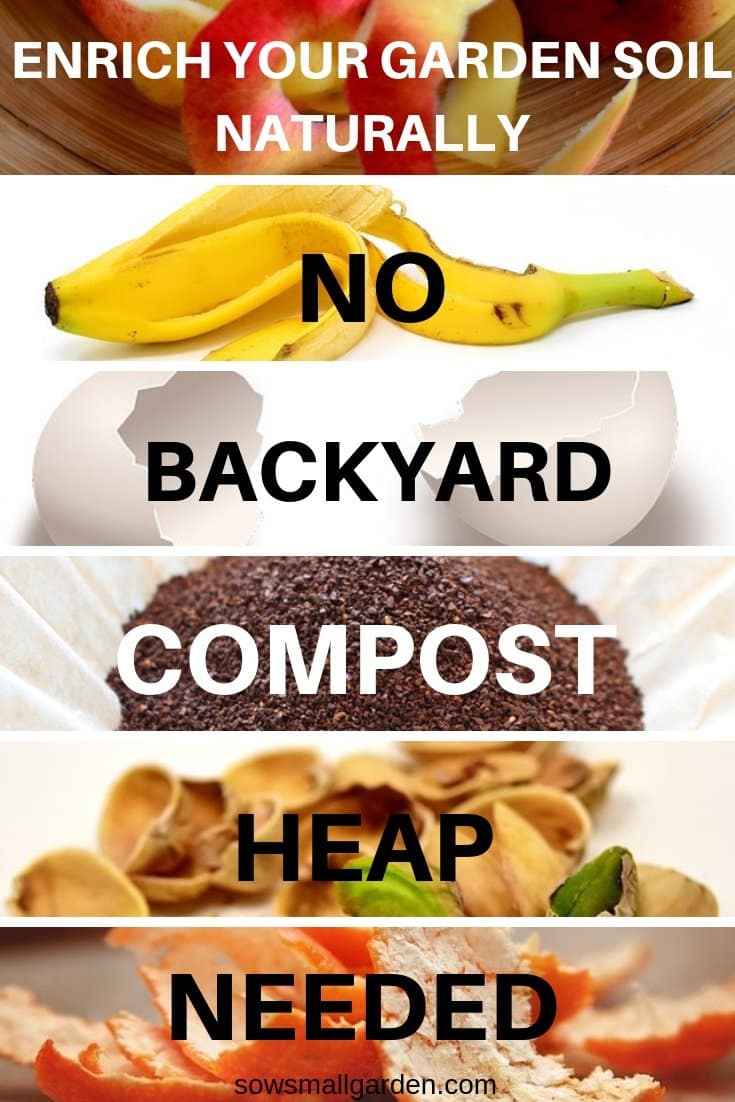
*This post contains affiliate links. If you choose to purchase any of the products I have recommended, I may receive a commission at no cost to you.
You might wonder:
Why fertile soil is so important?
It is because healthy garden soil produces healthy and better yielding plants. And healthy plants resist insect pests and diseases naturally.
Before diving into subject, let’s briefly recap some relevant soil fertility basics.
What makes soil fertile
Fertile soil is soil rich with mineral elements (nutrients) that make plants grow.
The most important nutrients, sometimes called the “big 3” are:
Nitrogen (N) – is essential for the production of chlorophyll, the pigment responsible for the green color in plants. It plays a vital role in promoting vegetative growth, such as the development of leaves, stems, and overall plant structure.
Phosphorus (P) – is involved in various processes within plants, including energy transfer, photosynthesis, and the development of flowers, fruits, and seeds. It is particularly important for seed germination and the overall reproductive health of plants.
Potassium (K) – helps plants in numerous ways. It promotes root development, improving the plant’s ability to take up water and nutrients from the soil. It also enhances disease resistance, overall plant vigor, and plays a role in regulating various physiological processes. Additionally, potassium contributes to the color, taste, and quality of fruits and vegetables.
These three nutrients are often referred to as primary macronutrients because they are required in relatively large amounts for healthy plant growth.
Fertilizer numbers meaning
All fertilizers that you buy in the store have 3 listed numbers on the bag.
These numbers represent percentage by weight of N-P-K (nitrogen- phosphorus – potassium) – primary nutrients needed for plants to grow.
For example, if you see on the label ratio 10-10-10, it means that this fertilizer has 10% of nitrogen, 10% of phosphorus and 10% of potassium, which is balanced fertilizer suitable for most vegetables.
Another 3 macronutrients required by plants in large amounts are calcium (Ca), magnesium (Mg), and sulfur (S).
In addition, plants, like people, need small amounts of trace nutrients including: iron, copper, zinc, boron, nickel, manganese, and molybdenum. Also, some plants must have silicon and cobalt in order to grow.
When you are applying fertilizer think of your plant needs and what you want to achieve: are you trying to get grass greener, lots of flower blossoms or a strong root system?
Gardening Tip
Soil can have all needed nutrients, but if soil is too alkaline (high pH) or too acidic (low pH) it will make it impossible for the plants to absorb nutrients.
How to enrich soil using kitchen scraps
So, now knowing which nutrients are needed for healthy fertile soil let’s see how common kitchen food scraps can help to build soil rich in nutrients.
1) Eggshells
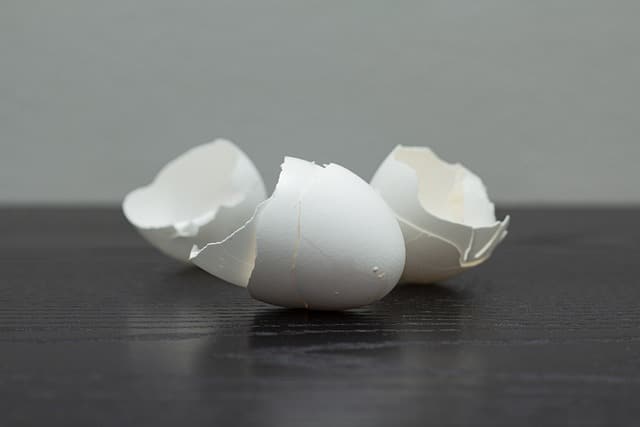
Eggshells provide calcium, as well as some nitrogen and phosphorus. They are an effective liming source for raising pH levels.
The shells should be dried and crushed before application. Just put them in a bag and give them a whack with a hammer.🔨 I bet your kids will love it!
You can sprinkle crushed eggshells around plants to prevent cutworms and slugs crawling to your plant and to repel ants. Or work a handful of crumbled eggshells into the soil to enrich it with nutrients.
2) Coffee grounds
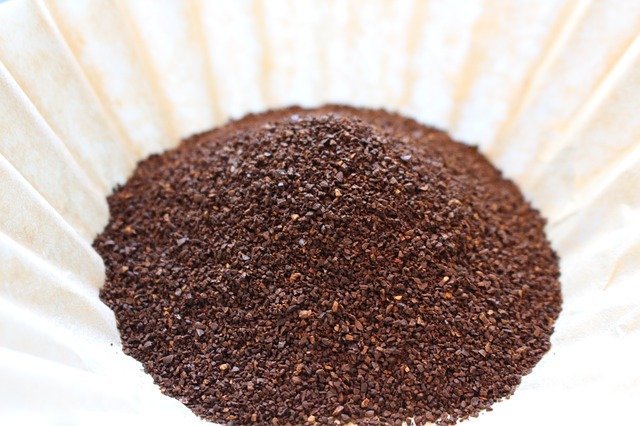
According to Oregon university extension center, coffee grounds are about 2% nitrogen by volume. They contain some potassium and magnesium.
Also, coffee grounds encourage the growth of microorganisms in the soil, (good thing!) provide food for earthworms, and improve soil structure.
Some gardeners report that sprinkling coffee grounds around plants will deter snails and slugs, especially around the hostas.
You can apply a thin layer of coffee grounds on top of the soil as mulch. Doing so will help your soil to retain moisture after watering.
You can also place coffee grounds under a layer of mulch or mix them with the soil.
I need to warn you, though, that there is an ongoing controversy about using coffee grounds in compost and coffee grounds for mulching. See recommendations concerning this issue in the Washington State University publication.
I, personally, wouldn’t use coffee grounds on geranium, tradescantia, and asparagus fern because research shows that coffee grounds inhibit growth of these plants. As for sprinkling coffee grounds around other plants, I wouldn’t be worrying too much, but read the study I referred to, and make your own decision.
3) Banana peels
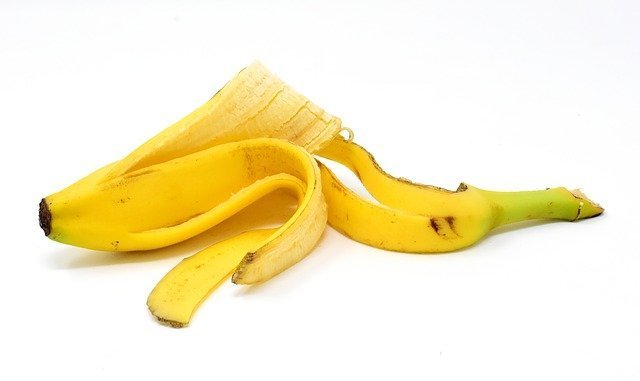
Banana peels (as well as bananas) have quite potent levels of potassium, phosphorus, magnesium, calcium, sulfur, and sodium.
I saw some gardeners throw whole banana peels near the base of the plant, especially around rose bushes, and swear that this helps to create abundant bloom and to deter aphids from the plant, but it looks quite unsightly and attracts fruit flies.
It is much better to cut or tear peels into smaller pieces and bury them in the ground. Or you can place whole banana peels on the bottom of the hole that is dug before planting a rose bush.
Another way to give your soil a boost of potassium and phosphorus with banana peels is to air dry them until they are crisp, then crush and sprinkle as fertilizer on top of the soil.
4) Seeds and nuts shells
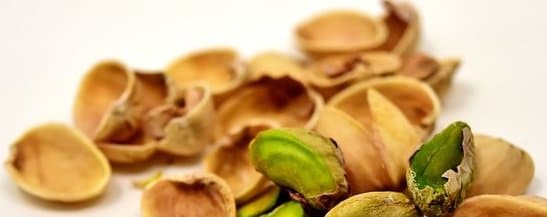
You can use shells from sunflower and pumpkin seeds, as well as nut shells: pistachio, peanuts, pecans – any nuts shells except walnuts.
Never put walnut shells near asparagus, cabbage, eggplant, pepper, potato, rhubarb, tomato, apple, blackberry, blueberry, or pear.
Gardening Tip
Do you know that all parts of the walnut tree contains juglone, which is toxic for some plants?
That is why it is not recommended to use walnut shells and walnut leaves in your compost.
Nut shells help to aerate soil.
If the nuts you use were salted (like salted peanuts) – wash the salt off before putting it in the garden.
Need some ideas what to grow in your garden this year? Read the articles:
Discover more gardening tips on growing and maintaining your garden.
5) Citrus peels
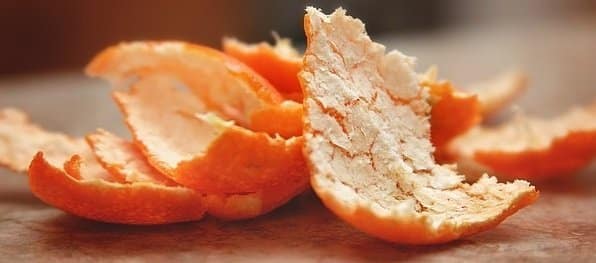
Applying citrus peels to the soil will enrich it with calcium and potassium.
You can chop citrus peels with a knife or give them a few pulses in a food processor or blender.
Orange peels scattered around plants should deter ants and soft bodied insects.
6) Tea bags or tea leaves
(black, green, grey, or oolong tea)
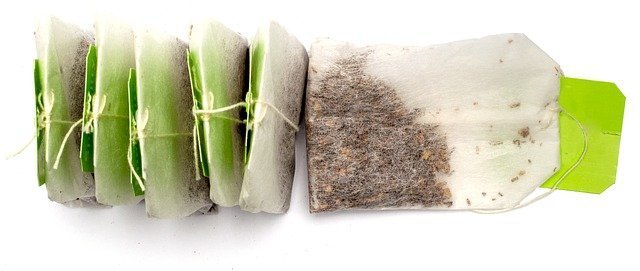
I would recommend to break open and dispose of the tea bag if on the tea box there is no mention that the bags are compostable.
Because all teas contain tannin – it is better to scatter tea leaves around plants that do well in slightly acidic soil – like radishes, tomatoes, parsley, potato, rhubarb, beans, broccoli, cabbage, squash, onion, currants, gooseberries,strawberries, raspberries, blueberries, grapes, apples, azaleas, nasturtium,begonia, caladium, daffodils, camellia.
You also can work tea leaves into the soil to protect radishes and onions from maggots.
7) Herbal tea bags or loose herbal tea matter
(leaves, petals etc.) like chamomile, all kind of mint teas, calendula petals, raspberry leaf teas etc.
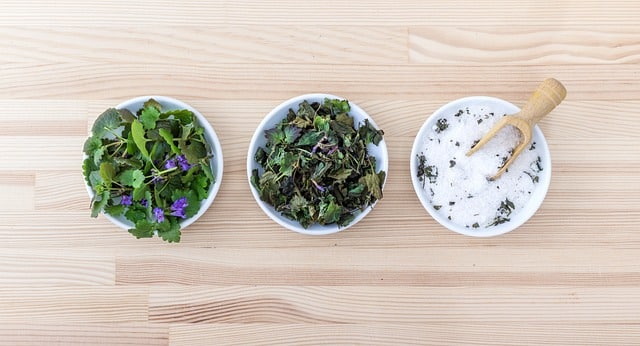
To apply: tear open a used tea pouch (dispose it if not marked as compostable on the tea box), and spread the herb matter directly on the top of the soil in thin layer or incorporate in the soil.
Read related:
8) Fruit and vegetable waste
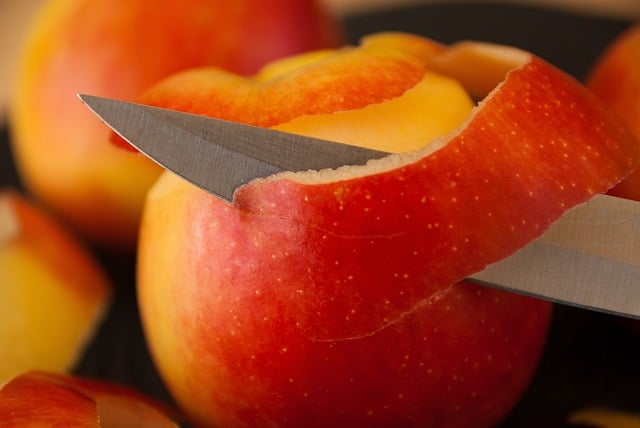
In nature, plants, if left untouched, will die and decompose back into the soil, enriching it with nutrients. When we place fruit and vegetable scraps back on the soil we will do as nature intended – fruit or vegetable scraps will rot supplying soil with a variety of nutrients.
4 easy methods of composting (no compost heap required)
1) Use kitchen scraps directly in the garden
As was described before, for composting food waste directly in your garden you need to tear-crush-chop-smash kitchen scraps and
- Sprinkle them on the top of the soil, or
- Lay under mulch, or
- Work into the top layer of the soil.
Using this method the food scraps should break down in 2-4 weeks depending on their size and weather conditions.
2) Dig and drop composting
There are 2 methods of dig and drop composting for you kitchen scraps: trench composting and pit composting (spot trenching)
For a larger gardens trench composting can be used.
All that you need to do is to dig at least 1 foot deep trench in your garden, fill it with 4-6 inches of kitchen scraps (exclude oils, dairy, meats, bread, rice in order not to attract rodents), make sure that material is moist, and cover it with soil. It should take 8-12 weeks to decompose scraps this way.
It is a pretty easy method, except remembering where exactly you buried your scraps. Mark the trench with flags and sow seeds next year over it.
Gardening Tip
Earthworms help to recycle food scraps into soil amendment called vermicompost (just a scientific name for a worm poop)
Interested in worm composting?
Learn how to get started here.
For a small garden (a potager, maybe even a square foot garden)- spot trenching is preferable. Just dig a hole with a shovel or use a post hole digger, drop your food waste, cover with soil and mark the spot. After 2 months plant a squash, cucumber, pepper or tomato plant over it.
Want to see how it’s done? Watch youtube video.
3) Garden Tower 2
Garden Tower 2 is a vertical container gardening and composting system that turns kitchen scraps into organic fertilizer for growing organic produce in tight spaces.
You can grow 50 plants in this innovative planter and recycle your kitchen compostable waste simultaneously by throwing it down the planter’s tube and letting the worms do the rest.
Garden Tower 2 – 50 Plant Composting Container Garden
Garden Tower 2 benefits:
- Garden and compost all in one
- Grow 50 plants in 4 square feet
- Easy to assemble (no tools required)
- Planter rotates for easy accessibility
- No weeding required
- Plants grow faster than in a conventional garden
Garden Tower 2 is made in the USA from food grade (non-toxic BPA and PVC free) plastic and backed by a 5 year manufacturer’s warranty.
In my opinion, if you have limited space and want to start a small vegetable garden – then Garden Tower 2 is a perfect solution.
4) Food waste composting machine (for indoor composting)
In order to make it really easy for yourself – without the need to crush, chop or bury food scraps – take a look at Vitamix Indoor Food Recycler and Kitchen Compost Container.
Vitamix (Indoor Food Recycler and Kitchen Compost Container).
You just put your kitchen scraps in the machine, turn it on and in less than 3 hours the nutrients rich soil amendment is ready.
The Food Cycler breaks and sterilizes food scraps entirely. With this device you can turn all your kitchen scraps into compost – including pet food, cereal, bread, cheese, meat, fish, and bones, something you cannot do with the other ways of composting.
According to the manufacturer, The Food Cycler is odorless, lightweight, can be placed on the countertop and doesn’t require any additives to work. Disadvantages that I see with this product is the need of carbon filter replacement and also the use of electricity to produce soil amendments.
Interested? Check it out on Amazon.
Ready-made organic soil enrichment products
If you would like to enrich soil naturally but do not have time for composting, there is an array of organic supplements for soil improvement on the market.
Bone meal (4 – 12 – 0) supplies soil with phosphorus.
Blood meal (12 – 0 – 0) enriches soil with nitrogen.
Oyster shell supplement provides calcium.
But if you are vegan – you wouldn’t want mentioned products in your garden.
In such case my favorite organic additives for the soil are alfalfa meal, cottonseed meal and kelp meal.
Alfalfa meal formula is 2.5 – 0.5 – 2.5. (You remember what those numbers mean, right? )
Cottonseed meal label reads 6 – 2 – 1. Because cotton seeds are acidic by their nature this supplement is the most beneficial for berries and flowering shrubs that like slightly acidic soil.
Kelp meal nutrients ratio is 1- 0.1 – 2. Use it as potassium boost for your vegetables and flowers, especially when they are grown from seeds.
Final thoughts on How to improve garden soil quality
Just like people, plants need nutrients to grow healthy. The easiest way to provide these nutrients is to utilize food scraps from your kitchen. Instead of throwing kitchen waste into the trash can or garbage disposal – use food scraps in your garden to improve your garden soil and increase its fertility naturally.
You can apply kitchen scraps directly in the garden, bury them in a trench/pit, get the Garden Tower 2 gardening and composting system, or make compost in your indoors tabletop compost machine.
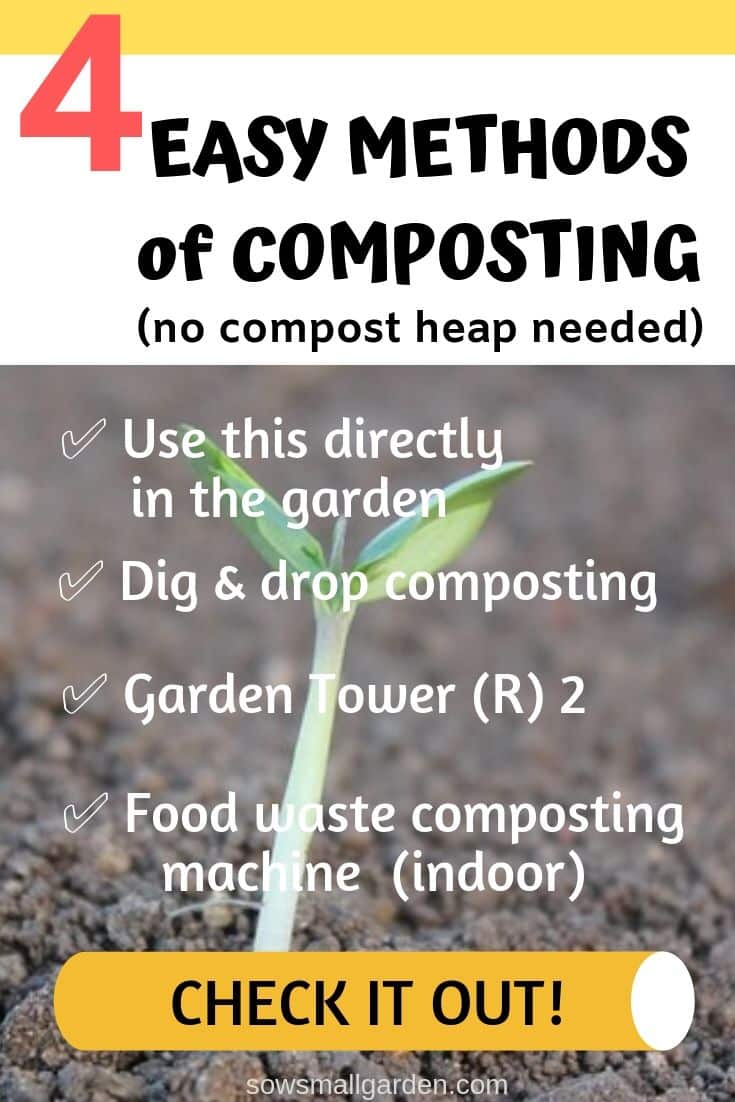
Pin for later reference!
No matter which method you choose – composting your kitchen food scraps will reduce household waste and improve your garden soil quality. And remember that building fertile soil is a continuous gradual process.
Do you compost your kitchen scraps? Share in the comments.
And if you found this article useful – be so kind to share with friends.
You have read:


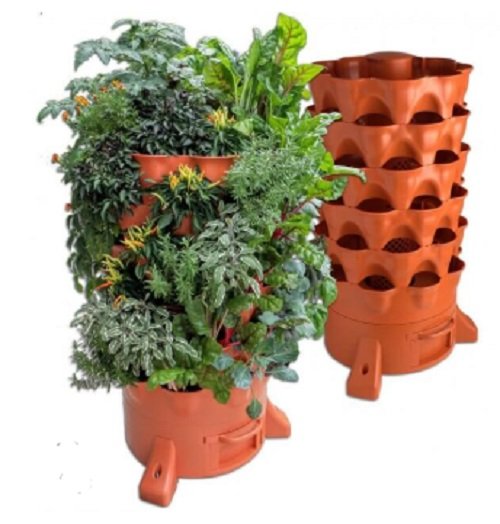
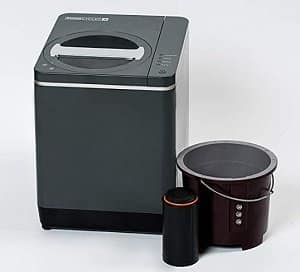
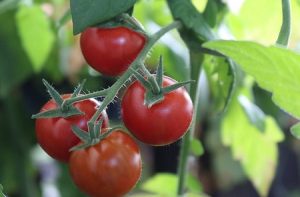
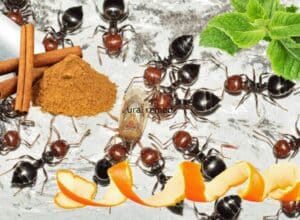
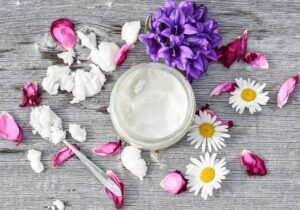
This was SO great. As a houseplant queen I found myself taking notes reading this! Never EVER knew about the coffee! Thank you for this! Great post!
I am so glad that you found it useful, Alanna! Yes, some things that you can do to improve the soil are really simple. Thank you very much for stopping by and commenting.